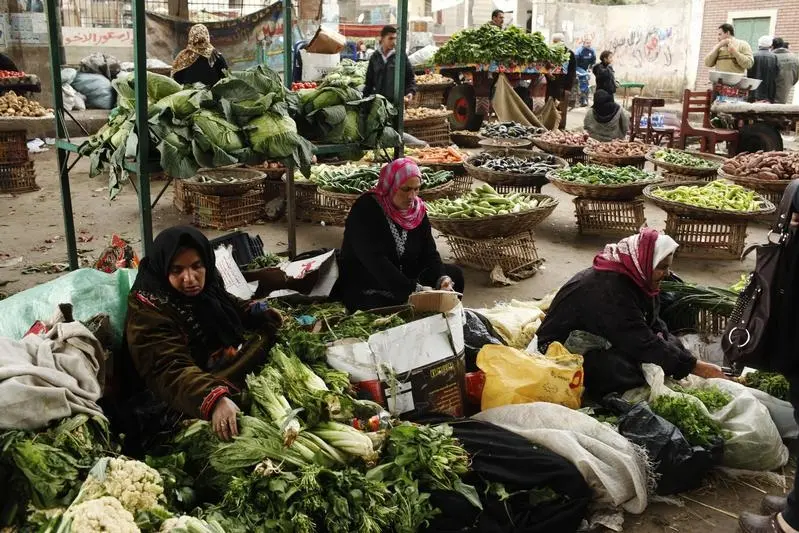PHOTO
The increased demand for food during Ramadan is putting additional burdens on the government and many households, reports Doaa Farid
Demand for food increases in Egypt by at least 30 per cent during Ramadan, with family feasts and gatherings after evening prayers being a main feature of the holy month. This year, however, the devaluation of the pound has meant that the prices of many items have begun to soar even before the start of Ramadan.
The Ministry of Supply has been trying to offset the increases by launching the Ahlan Ramadan (Welcome Ramadan) campaign, in which it holds nationwide sales of food at discounted prices. The sales are being held in coordination with the Federation of Egyptian Chambers of Commerce, the Food Industries Holding Company and private-sector retailers.
Inaugurated last Thursday, sales at the Ahlan Ramadan exhibition in Nasr City came in at LE10 million over two days. Ration cardholders can buy Ramadan packages, that contain many basic foods at reduced prices ranging between LE27 to LE112 depending on the content of the package.
Minister of Supply Khaled Hanafi has also promised to increase the quantities of food items produced by the Food Industries Holding Company. The cost of the measures is around LE1.5 billion, he said.
The government's attempts to provide basic food items at discounted prices before and during Ramadan are fruitful "as these measures are helping the neediest segments of the society," Alia al-Mahdy, an economics professor at Cairo University, told Al-Ahram Weekly.
Earlier this month, the government increased the value of subsidised food commodities for individuals from LE15 to LE18 in response to President Abdel-Fattah Al-Sisi's promise to increase allocations as a response to the inflation that followed the devaluation.
The increase in subsidies spending will not affect the country's budget deficit, according to Hanafi, who said that reductions in the cost of subsidies due to the exclusion of beneficiaries who have become ineligible will make up for the extra spending to offset inflationary pressures.
Hala Hameed, a 52-year-old housewife in Dokki, said prices of food have risen sharply for the past two months, since the devaluation. She said she is expecting further increases during Ramadan.
The Central Agency for Public Mobilisation and Statistics (CAPMAS) said on 10 May that urban consumer inflation rose to 10.3 per cent in April, up from nine per cent in March, in the first surge in five months.
The higher inflation was attributed to increases in the prices of vegetables by 2.82 per cent, fruit by five per cent, chicken by 2.9 per cent and seafood by 4.21 per cent.
The Weekly's monitoring of a number of consumer and Armed Forces outlets over the past few weeks has shown increases in prices. Standard prices for basic food items in late May were LE7.5 for a kilo of rice (compared to LE4.5 in March), LE5 for a kilo of sugar (compared to LE4 in March), and LE11.5 for a litre of cooking oil (compared to LE8 in March).
The prices of yameesh Ramadan, a Ramadan mixture, and nuts per kilo were LE30 for dates (up from LE25), LE16 for dried dates (up from LE12), LE125 for hazelnuts (up from LE115), LE12 for qamar al-din (dried apricots, up from LE8), LE120 for almonds (up from LE100) and LE32 for karkade (hibiscus tea, up from LE25).
A spokesperson at the Ministry of Supply said the ministry will be sending trucks to highly-populated areas to sell commodities at discounted prices.
The government's attempts to control prices before Ramadan are likely to be in vain, however, as it had not been able to curb price hikes in the past, according to Al-Mahdi. "Consumers are the only ones who can maintain price stability by boycotting outlets that sell at higher prices," he said.
With Ramadan approaching, Price increases are not the only thing worrying people. Mamdouh Taha, a retired accountant, said some food items are unavailable at grocers taking part in the ration scheme.
"When I went to the grocers off Al-Haram Street, I couldn't find any rice," Taha said.
At the start of the buying season, the General Authority for Supply Commodities (GASC) found itself confronted by traders who wanted to sell their rice at LE5,200 per ton, a high price compared to previous tenders. Unwilling to pay the quoted price, the GASC cancelled the domestic tender and issued an international one.
A few days later, however, the GASC cancelled the international tender, putting itself back to square one. The issue arose following a ban on rice exports by Minister of Industry and Trade Tarek Qabil in April after a six-month window period. Since 2012, rice exports have been repeatedly banned for temporary periods.
Local rice producers are said to have been driven away from supplying the government after the government failed to pay for previous supplies. The financial issue was said to have been resolved after the GASC paid its dues in April.
A spokesperson for the Supply Ministry said that the GASC contracted for around 20,000 tons of rice to be supplied last week by local producers, adding that these will be sent directly to consumer outlets at LE4 per kilo.
Food subsidies in the 2016-2017 budget were budgeted to cost LE42 billion. The number of ration cards currently in circulation is 18.7 million, benefiting around 67 million people.
© Al Ahram Weekly 2016





















